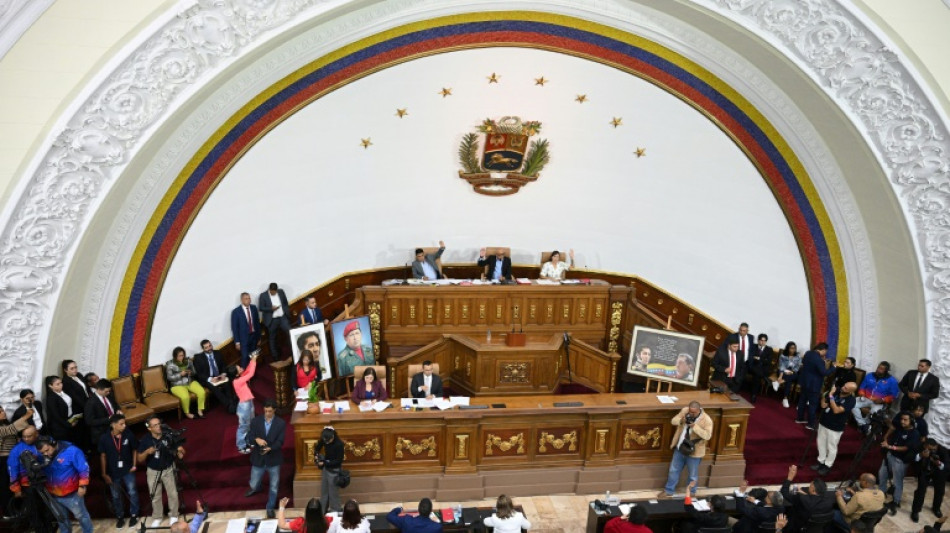
RBGPF
0.0000


The presidents of Brazil and Colombia called Thursday for fresh elections in Venezuela after last month's disputed victory by Nicolas Maduro -- a proposal quickly rejected by the opposition, who slammed the strongman for blocking a "political transition."
The two South American leaders, who spoke on the phone Wednesday to discuss a possible political way forward from Venezuela's post-election crisis, independently urged Maduro to consider a new election.
But Venezuelan opposition leader Maria Corina Machado said it would show "a lack of respect" for the popular will already expressed on July 28.
And opposition candidate Edmundo Gonzalez Urrutia, a 74-year-old retired diplomat who claims he defeated Maduro by a wide margin, accused the longtime leftist leader of "playing with the lives of millions" by refusing to cede defeat.
"The country's economy is getting worse and worse with each passing day with no political solution in sight, and you are responsible for this tragedy," Gonzalez Urrutia said in a video posted to social media on Thursday.
"Venezuela deserves a future of stability, prosperity and peace, but in order to have that, the will of the people must be respected."
For his part, Maduro, while not directly mentioning a new election, said: "Conflicts in Venezuela... are resolved by Venezuelans, with their institutions, laws and Constitution."
- 'Sensible' -
Brazilian President Luiz Inacio Lula da Silva said if Maduro were "sensible... he could try to appeal to the people of Venezuela, perhaps even organize elections."
Lula told a Brazilian radio station there should be "criteria for participation of all candidates" in a new election, which should "allow observers from all over the world."
Colombian President Gustavo Petro meanwhile called on X for the lifting of all sanctions against Caracas, a "general national and international amnesty," "new, free elections" and a "transitional cohabitation government."
In Washington, US President Joe Biden signalled he would back such a move, but the White House walked back his comment, with a spokesman suggesting Biden had been "speaking to the absurdity of Maduro and his representatives not coming clean about the July 28 elections."
It is "abundantly clear" that Gonzalez Urrutia won, the US spokesman said.
When asked about statements made by foreign leaders, Maduro said: "We're not going to conduct diplomacy at microphones. Every president, every country knows how to manage domestic affairs."
- 'Still managed to win' -
Machado, who was barred from seeking election by Maduro-friendly state institutions, told a virtual press conference Thursday that Venezuelans had voted "in very adverse conditions where there was fraud and we still managed to win."
The country's CNE electoral council proclaimed Maduro the winner of a third, six-year term, giving him 52 percent of votes cast but without providing a detailed breakdown of the results.
The opposition says polling station-level results show Gonzalez Urrutia won easily.
Gonzalez Urrutia and Machado have been in hiding since the president accused them of seeking to foment a "coup d'etat" and called for the pair for be jailed.
Maduro's victory claim has been rejected by the United States, European Union and several Latin American countries.
The Organization of American States will meet Friday at Washington's request to consider a resolution that would call on the CNE to publish detailed election results and allow independent verification of that data.
Anti-Maduro protests have claimed 25 lives so far, with dozens injured and more than 2,400 arrested.
- Legislative offensive -
Maduro has previously rejected the possibility of new elections and asked the country's highest court, also viewed as loyal to him, to certify the outcome.
Meanwhile, Venezuela's legislature on Thursday approved a law to regulate the registration and funding of NGOs described by Maduro's regime as a "facade for the financing of terrorist actions."
The law is one of several under consideration in the regime-friendly National Assembly that critics say are meant to criminalize Maduro's opponents.
The vast majority of the 277 lawmakers in the single-chamber National Assembly are loyal to Maduro, who had warned of a "bloodbath" if he lost his reelection bid.
Rights activists in Venezuela on Thursday raised the alarm over the NGO law, which they said would "deepen the persecution" of Maduro critics.
Since coming to power in 2013, Maduro has presided over an economic collapse that has seen more than seven million Venezuelans flee the country as GDP plunged 80 percent in a decade.
His previous reelection, in 2018, was also rejected as a sham by dozens of countries.
P.Grant--TFWP